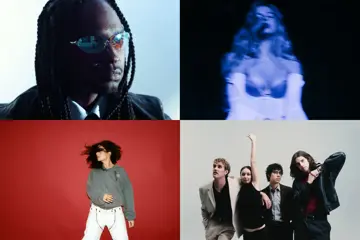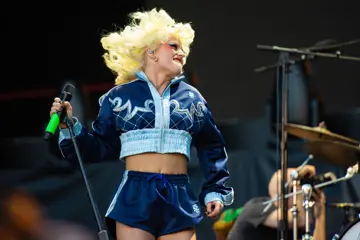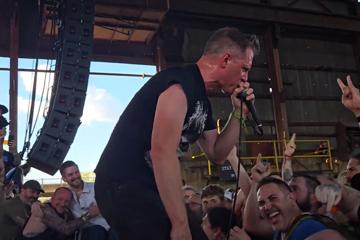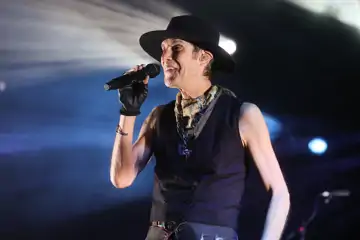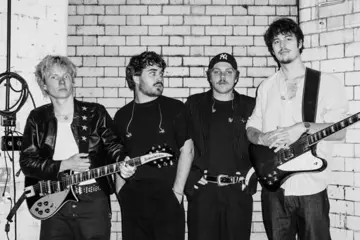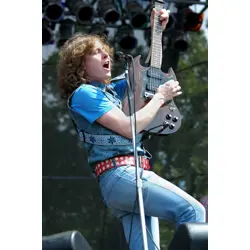 Ben Kweller
Ben KwellerIdlewild play The Zoo on Sunday.
Roddy Woomble, frontman for indie rockers Idlewild, is on the phone from Edinburgh, where the band are currently in the midst of rehearsals for their upcoming tour. A week before out interview he’d returned from spending the start of the year in Southern China – a place where he’d been able to appreciate the “fresh and unjaded” way people approach things in art, food, music and general culture. But it’s also a country where, Roddy says, “Everything’s challenged in the best possible way” – something that describes Idlewild’s last year down to an absolute tee.
2002, by all accounts, was a bit of a hairy ride for the Scots. First came the release of The Remote Part, a brilliant creation of standard Idlewild rock fair and a softer edge most often found on the recent records of – aak! - fellow countrymen, Travis. Not that Idlewild care for sing-a-long indie songs about rain, but the applause for their third album soon started pouring down by the bucket load. But then - just for a while - the glory days that Idlewild had so deserved since their first single release of Queen Of The Troubled Teens in 1997 started to run foul. Bob Fairfoull, to be exact. Idlewild’s bassist almost right from the start when the band met at a party in late 1995, left the foursome in a blur of contradicting reports. Whether you believe excitable rumours that it happened following fisty-cuffs with Roddy after a gig in Europe is one thing - but according to Roddy “you would have seen it from a long way off” if you’d been at all associated with the band over the last year. It’s something he’s obviously been asked about a lot lately, but “it wasn’t a surprise to anyone, really,” he says.
“For the past year we’d been drifting apart, as people do. See… people change,” Roddy begins, all weary Dad explaining divorce to his watery-eyed offspring. “I think partly the problem was that it was always me and Col and Rob that were the band, really, and I brought Bob in because he was one of my friends who basically had a bass guitar. The first two years were really great, and then he just started to drift away. The parallels with a relationship with someone are very, very similar – if things aren’t getting on and you know things aren’t right, then something’s going to happen. The day it happens things are generally not going to be pleasant, but ultimately it’s going to be better for everyone.”
The upshot, he says, is that it’s become “a pleasure to start playing again,” something that would ebb and flow with Bob, who, admits Roddy, contributed to the “really awful concerts” as well as the “really good ones” by alternately causing his frontman to be “turning around thinking ‘What the fuck are you playing? You’re playing a different song than the rest of us!’” or “turning around thinking ‘Wow, this guy’s amazing’.” But even though his answers when it comes to Bob are long and concise, Roddy claims not to dwell on it.
“Basically,” he concludes. “it was becoming a problem in everyone’s life - in his life and our life - and it was making everything really unpleasant. And now everything’s not unpleasant.”So enough about Bob (who’s since joined Edinburgh rockers Degrassi). Because now, we’ve got two new players to, er, play with – bassist Gavin Fox (“Fox by name, fox by nature” was the NME’s recent swooning conclusion, ladies) and guitarist Allan Stewart made their official debut as members of Idlewild the day after Roddy got back from China, on Top Of The Pops mid-January. For his part, Allan had “contributed so much to the band the past couple of years” as Idlewild’s on-tour guitar tech that the three remaining members thought it would be “offensive to not actually suggest” he join up. And Dubliner Gavin was wooed away from his post fronting indie-rockers Turn by a simple “y’know, if you want to…” call from Roddy, because it seemed like “the completely natural thing to do” to take it up to a five-piece. Ultimately, “it’s so positive it’s unbelievable.”
“There’s now a better relationship between people in the band,” Roddy gushes. “And also Allan and Gavin are songwriters themselves, they come up with ideas and they write songs, and Gavin sings - even when we’re playing through some of the old songs at practice, it’s like we’ve reinvented some of (them), they kind of sound like new songs!”
nd despite The Remote Part being “in my mind, the strongest collection of songs we’ve done, by quite a long way”, there’s still a place for those old songs. Unlike many new bands emerging under the banner of the new rock revolution, Idlewild didn’t hit the critic spotlight right from the start – their mini LP Captain, first album Hope is Important and second, 100 Broken Windows, received minor critical acclaim but never broke through to the masses like their latest release has. The evolution, Roddy’s decided, feels “natural” and “organic”, something that’s been denied a lot of new millennium bands in the never-ending search for immediate perfection on debut. For Idlewild, it’s been a six year process – something that’s carried through their unpredictable live shows, that used to be so erratic they’d culminate with their frontman rolling about on the floor and howling inaudibly into the microphone.
“When we first started, I wanted to walk into the situation and be completely unpredictable,” he concludes. “But then, we just sacrificed the music for that; we just wanted a chaotic performance that people would remember, and unfortunately, we couldn’t write any songs that people would remember. But over five years it’s completely changed; we still have that nature, we have that unpredictable edge, but obviously now we have a collection of songs that are really powerful and really strong – especially live.”



